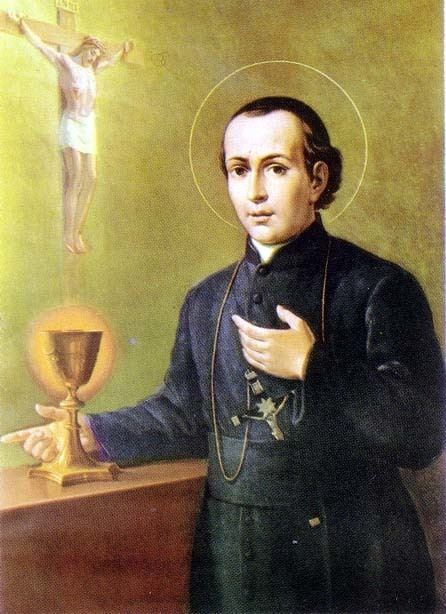
Life
St. Gaspar del Bufalo was born on the Feast of the Epiphany, January 6, 1786, in Rome. His parents named him after the Magi who visted the Christ child: Gaspar Melchior Balthazar del Bufalo. It was an apt name for a man who would spend his life on a quest to fulfill the will of God. Gaspar was raised in the bustle and activity of the Eternal City. When Gaspar was a little boy, his father was hired as a cook for a family with royal connections, and the family moved to the Palazzo Altieri, in the heart of Rome. As a child, Gaspar suffered from a near-fatal illness, and his faith-filled mother, Annunziata, dedicated him to St. Francis Xavier. At a young age, Gaspar knew his calling, and he visited the sick and the poor, often stopping at a bakery first to buy a sweet treat to share with them.
He was ordained in 1808, at the age of 22. Soon after, he formed an evening society for the laborers and farm workers who came into Rome to sell their wares. He wanted to bring them back to the Church, and to show them that, even though they struggled to survive on the streets of Rome, their lives had value. Gaspar was caught up in the political crisis when Napoleon swept into power in the Papal States. The new anti-clerical government demanded that priests sign an oath of allegiance to Napoleon. Gaspar declared, “I cannot, I must not, I will not.” His refusal to sign the oath led to four years of exile and imprisonment. Many priests, bishops and even the pope were also exiled in those years. Away from home, unsure about his future, unable to continue in his many ministries, and in misery over the death of his beloved mother, Gaspar struggled against despair. But also during that time, mentored by Francesco Albertini, Gaspar nurtured his devotion to the Precious Blood of Jesus.
After Napoleon’s defeat, he returned to Rome in 1814 and threw himself into his preaching ministry. Through spreading the Good News of the Gospel, he believed he could help heal and revive a Church that had been sorely tried and tested. On August 15, 1815, St. Gaspar founded the Congregation of the Most Precious Blood (C.PP.S.) in Giano, Italy. It was a very small congregation, with only four members (including St. Gaspar). They began to preach in towns throughout central Italy. As they preached mission after mission, igniting the fire of faith in God’s people, they began to draw more members to their new Congregation.
Life was not easy for St. Gaspar. He was mocked and threatened by those in the anti-clerical movement of the day. People in his own Church often did not understand or support what he was attempting. Money for his fledgling congregation was always in short supply. In the years that followed, St. Gaspar never stopped moving. He founded 15 mission houses and encouraged more young men to join his Congregation as priests or brothers. He continued throughout his lifetime to reach out to those who were alienated from society. When the countryside fell into the grips of bandits, Pope Pius VII threatened to raze the town of Sonnino, which had become the bandits’ headquarters. Gaspar begged for the chance to save the town. He preached to the bandits until they accepted his message of reconciliation and redemption—and saved the town from destruction.
Through it all, he inspired others to follow him, always expanding his circle. Through his preaching, a young woman named Maria de Mattias was moved by the spirituality of the Precious Blood to found the Adorers of the Blood of Christ in Acuto, Italy, in 1834. (Maria was canonized in 2003.)
Gaspar died on December 28, 1837, in Rome, where he spent the previous summer ministering to those affected by an epidemic of cholera. The physician who examined him said Gaspar died a “victim of charity,” worn out by his ministry to others. St. Gaspar was canonized by Pope Pius XII in 1954. His work continues through his Missionaries around the world. St. Gaspar never turned back. Weakened by ailments, called a fanatic or fool by people who should have supported him, imprisoned and impoverished, and challenged at every turn, his answer to God’s call was always yes. His followers continue to turn to him for inspiration, as they fulfill the wish he once expressed: “I wish that I could have a thousand tongues, to endear every heart to the Precious Blood of Jesus.”
https://cpps-preciousblood.org/about/founder/
Scripture. Hebrews 13:12-15, 20-21